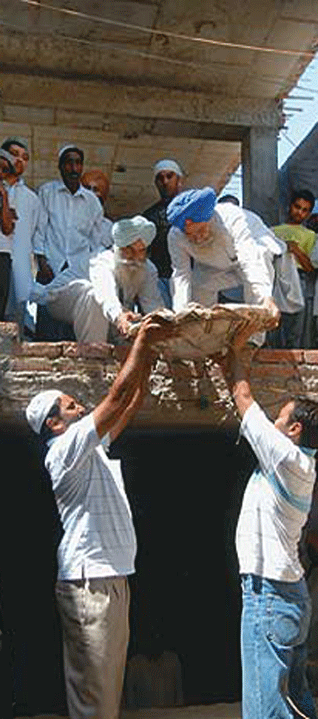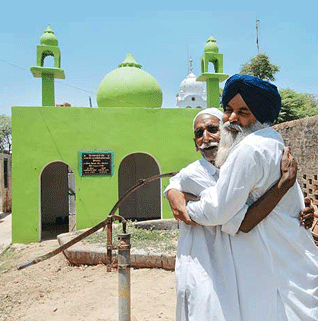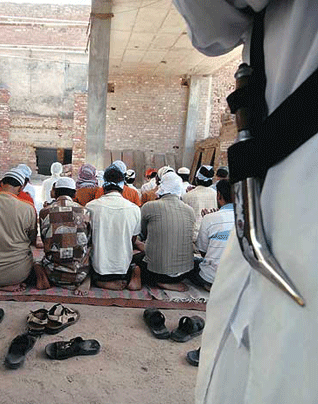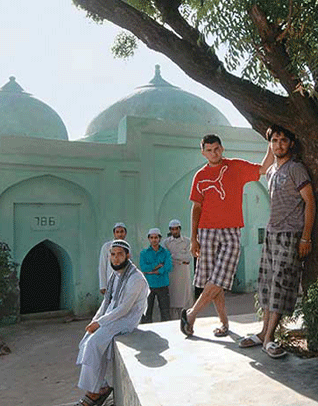Partition
Punjabiyat is Alive and Well in Sikhdom
by CHANDER SUTA DOGRA
- Around 200 mosques across Punjab have been repaired, rebuilt or built from scratch in the last 10 years
- Many destroyed during Partition riots are now being restored by village communities
- In some cases, the Jamaat-e-Islami is involved, but most are unorganised village-level efforts
- It's a reassertion, after decades, of Punjab's unique religious and cultural synthesis
Sajjan Singh's family of Sarwarpur, near Ludhiana, cannot understand what the fuss is about.
Ever since Sajjan Singh from England rebuilt a mosque in his native village that was damaged during Partition, the shrine, as well as his family back home, have attracted the curiosity of outsiders.
"We never imagined we would be on a Punjabi TV channel just because my elder brother rebuilt this small mosque for the poor Muslim families of our village. For him, it was just a gesture towards restoring the collective heritage of our village," says Sajjan's brother, Joga Singh, who manages the family's lands in Sarwarpur.
Sure. But what Joga and his family, or even the TV channel, do not know is that the sentiment that inspired his brother's act is being manifested in scores of villages across Punjab, with Sikhs helping rebuild old and damaged mosques or building new ones.
Odd? Perhaps. But Punjab, as admirers of its unique religious synthesis say, has always defied stereotypes to do its own thing.
That spirit comes through clearly in the actions of a group of school and college boys from 600-year-old Ajitwal village near Moga. During Partition, when Muslims fled Ajitwal, just as they fled in waves from other parts of Punjab, an ancient village mosque was vandalised. As years passed, someone encroached on its grounds and the place became a village dumping ground. A neem tree on its compound became a hang-out for the village youth. One day, a bunch of boys decided to clear the muck. Within days, the entire village joined them.
Says 20-year-old Laddi: "We were never short of money or material. Anyone who passed this way would contribute in cash or kind. Someone brought five bags of cement, another donated bricks and so on ..." This, when there were no permanent Muslim families left in the village. But, once repaired, the mosque began to be used.
A few Muslim migrants from Uttar Pradesh and Bihar, labourers and petty tradespeople, began praying here. A maulvi from a neighbouring village now comes to conduct Friday namaaz.
To the delight of 80-year-old Nachattar Kaur, who was born and brought up here, the sound of the azaan (call to prayer) is being heard again, after decades. "We have always believed in this shrine," she says. "It is a house of God. God bless these boys for restoring the oldest relic of our village."
In Malerkotla, the headquarters of the state unit of Jamaat-e-Islami (Hind), publisher and Jamaat member Ramzan Sayeed, who has also translated the Quran into Punjabi, observes, "It is only in Punjab that Sikhs are helping to build masjids with tractors, labour and money." That this should happen at a time when Islamists are being reviled and resisted across the world makes it remarkable; and that it should be happening in a land where the soil is soaked with the blood of Partition, and stories of murder, rape and looting have been passed down the generations, renders it especially significant.
In the months after Partition, some 50,000 mosques across present-day Punjab, Haryana and Himachal Pradesh were destroyed, burnt or converted into temples and gurudwaras - homes, even. Today, Muslims comprise just 1.5 per cent of Punjab's population, mostly migrant labour from UP and Bihar and some Gujjar families from Jammu and Kashmir who have settled here, in addition to small pockets of Muslims, such as those belonging to Malerkotla, who did not go to Pakistan in 1947.
However, in the last decade or so, the Jamaat has managed, with extraordinary village-level support, including money and materials, to free and revive about 120 mosques. Scores of others, like the one at Ajitwal, have been revived or rebuilt purely by villagers themselves. Jamaat president Arshad Ali told Outlook, "We consciously involve Sikhs whenever we help build a new mosque or repair an old one; and every time, the community's response is overwhelming." He reels off the names of scores of villages where this has happened.
One of them, Diwa Gandwan in Fatehgarh Sahib, has only 17 Muslim families, most of them poor labourers. Mohammed Jameel, a farm labourer who lives in the village, told Outlook, "We never imagined we could have a masjid of our own, but we do now. It would not have been possible without the help of the Sikh landlords here, who filled up the low-lying area by bringing us earth in their tractor trollies." The first brick of the mosque was laid by a Sikh priest from Fatehgarh Sahib, who also donated money.
Arshad Ali contrasts this attitude with the one that prevailed when he began working for the Jamaat in Punjab some 30 years ago: "We used to face opposition whenever we tried to assert ourselves. But all that has changed now. Our effort to construct masjids is helping foster religious brotherhood in Punjab." Hassan Mohammed, the imam of the Jama Masjid at Mandi Gobindgarh, recalls that last year, when he tried to mobilise Muslims of Jhampur village to rebuild their village mosque, they were afraid of even the suggestion.
He then approached the sarpanch, a Sikh farmer, who immediately got a few boys to clear the overgrown area. Other villagers chipped in with contributions in cash and kind and, soon, what was once a crumbling ruin became a vibrant place of worship.
Such stories abound in rural Punjab today.
There are no clear-cut answers for why this is happening. It helps, clearly, that Muslims are only a tiny, largely poor, community here, no threat to anyone, and that sympathy for the underdog is a distinctive Punjabi - especially Sikh trait. But that's only a partial explanation, as is the other obvious one-that this is a manifestation of collective guilt over the atrocities committed by the communities against each other during Partition.
Guilt could be a factor, acknowledges historian and writer, Prof Gurdarshan Singh, "There is no doubt," he says, "that the atrocities of Partition are a blot on the history of the Sikhs. We, as a martial race, are not supposed to attack the weak and unarmed, but it happened, and ever since then, there has been remorse." He recalls how a few years before his death, Gurcharan Singh, long-time president of the Shiromani Gurudwara Prabandhak Committee (SGPC), confessed that he too had killed a Muslim during the Partition riots and felt haunted by his act. Possibly to atone for the act, Gurcharan Singh constructed a mosque in his native village and laid its first brick with his own hands.
On the other hand, much of the present effort to revive mosques is
coming from a generation that does not have the blood of Partition on
its hands; one that has witnessed and endured, rather, the violent Sikh
separatism during the '80s. That's why the Director of the
Chandigarh-based Institute of Development and Communications feels this
is "the collective reassertion of Punjab's unique cultural synthesis"
and "an attempt to build a secular Punjabi identity, as opposed to a
communal identity or religious one".
Scholar Prof. Gurtej Singh, offers another explanation: "This is an
instinctive manifestation of the Sikh's disillusionment with a
Hindu-dominated Indian state that has done all it can to obliterate Sikh
identity. During Partition, we were made to believe that Muslims were
our enemies and we massacred them in large numbers [in retaliation]. We have now realised
that not Muslims, but Hindu-dominated parties like the BJP are the real
threat to our identity."
Pointing out that Sikhs and Muslims have gradually come to value each other, he relates an anecdote about Shia Muslims recently discovering how Sikhs protected one of their shrines in Samana in Punjab, and how they are returning the gesture by helping Sikhs build gurudwaras in the Gulf. He also lauds Pakistan for enacting a Sikh Marriage Act which he helped draft, whereas India is yet to do so.
"These things," he says, "accumulate in the popular psyche, and manifest themselves in various ways".
But try telling 67-year-old Kesar Singh or 24-year-old Kamal Vohra that this is only a story of Sikh-Muslim bhaichaara. Kesar Singh, a farmer from Ratia, some 15 km from Dhuri who has slogged for days to rebuild Dhuri's lone mosque. Kesar Singh admits to a special bond with the mosque, which he visits every week, along with 20 other Sikhs of Ratia, for Friday namaaz.
"The old imam has been my friend for the last 50 years and I enjoy his liberal interpretation of the Quran," says he.
As always, Punjab never fails to surprise.
[A version of this article first appeared in Outlook]
June 27, 2010
Conversation about this article
1: Kamaldeep Singh (London, United Kingdom), June 27, 2010, 2:49 PM.
Before setting up mosques in Punjab, may I ask our Muslim brethren to return Nanakana Sahib to the Sikhs.
2: Surinder Sikand (Foster City, California, U.S.A.), June 28, 2010, 2:33 AM.
I am immensely pleased to know we the Sikhs of Punjab are regaining the lost culture of United Punjab after more than a half a century. I have been waiting for this day since 1947 and now that I am 76, I'm looking forward to see progress during my visit to Punjab in November 2010.
3: Akram Varraich (Wazirabad, Punjab, Pakistan), June 28, 2010, 9:09 AM.
I want to see Guru Kotha of Wazirabad restored by the Muslims here in Pakistan!
4: Raj Singh (Ottawa, Canada), June 28, 2010, 10:21 AM.
I fully agree with comments numbers 1 and 2 above. Let's see some efforts by the Pakistani Muslims to re-build our gurdwaras. There are hundreds of gurdwaras in Pakistan which are crumbling and falling apart - or have been taken over by private interests. Why has no Pakistani ever come up to repair our places of worship? It will never happen. This faith will never be tolerant of other faiths. That's a given. No Islamic country in the world provides religious freedom to non-Muslims. I'm sorry, but I fail to see any formidable need to go around and start repairing mosques in our own backyard. Sikhism is already under threat from internal and external forces. There are masses of poor Sikhs converting to Christianity because we as a community, a people and a society have failed them. The threat of Sangh Parivar and RSS needs no introduction and nor does the utter failure, incompetence and lack of any vision of our political and religious leadership. In light of all this, we don't need to start building mosques for people who committed the most heinous and successive genocides on our people one after another over hundreds of years. If they want to build the mosques with their money and resources, I'd be less opposed to it, but it's still not welcomed. Our gurdwaras are being torn down in Afghanistan. Pakistan treats its Sikh minority no better. The least we need is another threat within our villages. Yes, this is a threat. These people who are building these mosques are nearsighted and are forgetting the history and don't know the true nature of the faith they think they are helping.
5: Abaid Mughal (Birmingham, United Kingdom), June 28, 2010, 2:44 PM.
I was overjoyed to read the article and thought maybe humanity can survive after all. Until I saw the 4th comment (by Raj Singh, Ottawa, Canada). I am a Muslim Punjabi (humanist first) and totally agree with his comments. Muslims also need to reach out and reciprocate and prove Islam is also a tolerant faith just like Sikhism. I take my hat off to the Sikhs in Punjab who have taken such a courageous step. Your courage, wisdom, kindness and tolerance are commendable, and are a shining example to all of us. In the words of Guru Nanak: "Truth is higher than all else. But higher still is truthful living".
6: Surinder (Massachusetts, U.S.A.), June 28, 2010, 4:42 PM.
I am glad that the Sikhs in the Punjab are building places of worship where they will be not allowed to step inside at any time! As you well know, in a Muslim place of worship, the Masjid, non-Muslims are not allowed. So our Sikhs are building places where they themselves will not be allowed to step in! In addition, there are no Muslims in the area, as all the Punjabi Muslims left for Pakistan. So the wise Punjab Sikhs intend to import some some from UP and Bihar. Given that our men are heading to Canada and US to become citizens there, there is a lot of space in Punjab's society for men. Last, but not least, while we are building local (that is non-historical) masjids, the historic gurdwaras in Pakistan have been usurped. For example, a gurdwara in Dera Ismail Khan called Gurdwara Thara Sahib, associate with Guru Nanak, has been converted to a local school. A gurudwara in Muzzafarabad (PoK) where the Sixth Guru stayed and was a historical gurdwara has been converted into a police station. I am glad we are building masjids, while the Pakistanis are putting our gurdwaras towards better schools and police stations. This certainly sets up a great example. What was that thing about history repeating itself for those who forget it?
7: Surinder (Massachusetts, U.S.A.), June 29, 2010, 12:54 PM.
I might have created an impression in my last post that only two gurdwaras were erased by Pakistan. What I meant to say was thousands of gurdwaras went into oblivion in 1947. Non-historical gurdwaras are all gone. The massive amount of land grants attached to major gurdwaras have been usurped. Historical gurdwaras are in a state of extreme decay. In Peshawar, the government of Pakistan refuses to hand over the Sikh gurdwaras to Sikhs there. So it is not just two that I mentioned; that was merely to illustrate the point. Secondly, another point is that after the masjids are established, Punjabis would see demands for burial grounds (which unlike Hindu/ Sikh needs) will mean increasing grounds as the old burial grounds cannot be reused. Rab Rakha.
8: Ali Khan (Pakistan), June 30, 2010, 4:07 AM.
I visited my ancestral village near Jalandhar about ten years ago. The village mosque was in the process of being converted into a gurdwara. Since there are no Muslims there, it is, perhaps, understandable. There was a Muslim shrine in the village that was well looked after.
9: Bikramjit Singh (London, United Kingdom), June 30, 2010, 3:37 PM.
It is good to see that Sikhs of the diaspora are wiser about what Islam means than the ignorant Sikhs in India rebuilding places which will one day become a thorn in the sides of their descendants. With Islam becoming more and more fanatical, with millions armed to the teeth and willing to blow themselves up just across the border, these fools think it's a good idea to build mosques, especially where there are no Muslims! Mosques everywhere are being funded by and built by Wahabis and Jamaat-e-Islami fanatics. It is ironic that whereas the rest of the world has begun to understand the danger of Islam, the one place and the people who suffered the most from Islam, just short of a complete genocide, are supporting it's growth in their midst. God save the Sikhs in Punjab. First from the Muslims ... then the Hindus!
10: N. Singh (Canada), June 30, 2010, 5:00 PM.
Once again, the Sikh intelligentsia in Punjab has failed its people ... someone needs to give these fools some advice ... they are playing with fire!
11: Plate (U.S.A.), June 30, 2010, 7:50 PM.
Words fail me at these stupid and dangerous actions of the few. Tolerance is good of other religions but not to this extent. This is why one needs educated leaders and intelligentsia to educate the masses about our history (1947) so the future generations do not make the same blunders. But how can we think of the future when the current generation has gone bonkers. We need another poem similar to Amrita Pritam's ('aj aankha warish shah nu'). Waris Shah must be turning - nay, spinning - in his grave.
12: Surinder (Massachusetts, U.S.A.), July 01, 2010, 10:49 AM.
Recently, I went to a major central Punjab city and right smack in the center of the market is a new masjid. I was told that this was a masjid before partition and then after partition when the Muslims left for their paradise land, it was made into a gurdwara. Recently the gurdwara was then given back to the Muslims and reverted to being a Masjid again. Why would the Sikhs abandon a good functioning gurdwara for a small community? In a place like Punjab where people seldom vacate lands or buildings once taken, how come the Sikhs vacated this property is something I find very puzzling. Anyways, I walked by and peeked in. I saw some 5-10 typical Punjab Police guys (turbans, trimmed beards, pot bellies, machine guns in their laps) sitting at the entrance guarding it. Number of worshippers were few, if any. In India, if you have been able to get this kind of permanent security then there something is fishy, really fishy. The resources required for this 24x7 protection are massive, this kind of protection comes only if there is some high-level protection and understanding to revive masjids in Punjab. Something does not smell right.
13: N. Singh (Canada), July 06, 2010, 2:19 AM.
Now you have got me thinking, Surinder! I have been reading on BBC World News how the Taliban are gaining more momentum in the Punjab area in Pakistan. Is there a deliberate attempt to revive Islam within Punjab in India so that fighting can be extended to that region? I suspect that all possible avenues are being used by the Indian government to wipe out Sikhi and the Sikhs, and introducing Islam is just another strategy! This will be a very interesting and disturbing line to watch. Thanks for sharing.
14: Aamir (United Arab Emirates), July 31, 2010, 3:41 AM.
The efforts by these people in Punjab have been very well nullified and raised to the ground by the comments of the others. This is a fantastic example of lunatic jingoism. These guys brainwashed by anti-Muslim propaganda think that it is morally right to keep a mosque occupied. Killing of innocents, destruction of places of worship, are forbidden in Islam, and any one resorting to such acts is defying the ruling of Islam. I thought that change was on the cards, but the comments of these guys have made me think otherwise.
15: Tinku (Punjab), January 27, 2012, 2:49 AM.
I don't understand why Sikhs are building mosques for the Muslims. Sikhs building mosques and joining in namaaz should visit the venom Muslims are spreading against Sikhs on some sites on the internet.
16: Salman (Hyderabad, India), June 05, 2013, 1:45 AM.
I thank my Sikh brothers for the bottom of my heart. Your community has always stood besides the Muslim community during our bad times. May God bless you, brothers and sisters, I pray. It is only because of you Sikh brothers and sisters that I feel, yes, India is a secular country.






